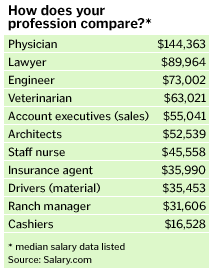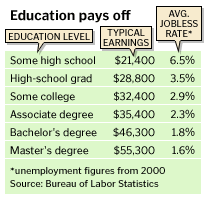New York (CNN/Money) – Admit it. You've paused to consider at least once or twice how your paycheck compares with co-workers' and friends'. Do they make more money than you?
In a society where self-worth is too often confused with the size of one's bank account, salaries remain the ultimate yardstick.
"There's a natural tendency to want to compare ourselves to other people. How much did you make in the market? How much did your house cost? Money ... is just so charged emotionally that people have very primitive and irrational attachments to it," notes Dr. James W. Gottfurcht from the Psychology of Money Consultants in Los Angeles.
It's bad form to ask what your officemate brings home, but there are plenty of wage data available to help you determine where you fall in the financial game of life. A simple bread-and-butter approach to salary searching, for example, reveals the average salary in this country stands at $35,926, according to the Bureau of Labor Statistics.
Another option? Compare yourself to your neighbors and look at regional pay data. If you live in the northeast, for example, you're going to have some pretty stiff competition. That's because four of the five states boasting highest average incomes are tucked away in the New England area. (Maybe there's something to that Puritan work ethic after all.)

The richest states include top-ranked Connecticut, where salaries average $45,555. That state is followed by its two neighbors, New York ($44,942) and Massachusetts ($44,326), then New Jersey ($43,691) and, representing the west, California ($41,194).
States where earners bring home the thinnest paychecks include Montana ($24,264), North Dakota ($24,678), South Dakota ($24,803), Mississippi ($25,197) and Arkansas ($26,307). Of course, the cost of living in South Dakota and other low-pay states is a lot less than Connecticut and California, and incomes reflect this. To find out how far your salary would stretch if you moved, check out our cost-of-living calculator.
What's in a salary?
Of course, a variety of factors are going to impact your salary no matter where you live. Let's start with your skills.

While a person with a Ph.D. in medieval poetry won't likely make more than, say, a worker with a bachelor's degree in engineering, generally speaking, earnings do increase in step with your education. Consider: the median salary for a worker with a master's degree now stands at $55,300; the figure for someone with a bachelor's is $46,300. For someone with no high school degree, the median salary stands at $21,400.
There also appears to be a strong correlation between job stability and education. Last year's unemployment rate for wage earners with master's degrees stood at 1.6 percent. The jobless rate for high school dropouts was 6.5 percent, the BLS has found. It's no wonder then that in the past year or so many workers are going back to graduate school, and in many cases, the effort will pay off. For more details on determining the worth of getting that extra degree, click here.
Your profession sets your pay
There's a reason your parents nagged you to drop your life drawing classes and become an orthodontist. Orthodontists typically earn $129,000 a year while artists pull in about $25,000 annually, according to the BLS. Our point? Your salary depends to a large degree on what you do for a living. (For a list of the highest-paying degrees, see our story.)
That said, before you bemoan the fate of actors, remember that others make even less. Farmers, for example, grind out about $15,800 a year (though ranch supervisors make twice that amount). On the other end of the spectrum are professionals like venture capitalists, who take home a typical base salary of $222,985 (excluding bonuses), according to Salary.com, a Web site that tracks pay data for hundreds of professions.
Wondering about your own profession? It's bad form to ask, of course. But the Internet has sprouted an array of job sites that publish free salary data that let you find out on your own. Some of the best information can be found at the our salary calculator, or check out the Department of Labor site or America's Career InfoNet.
If, while searching, you find your own paycheck falls a little short, try to keep a balanced perspective about what's important in life. Gottfurcht, from the Psychology of Money Consultants, tells wage earners who fret about how much they make to "develop a regime of nuturing activities such as yoga, exercise, being in nature, taking walks or listening to music."
"Friendships are also so important - talking" he adds. "These activities release anxiety."

|

